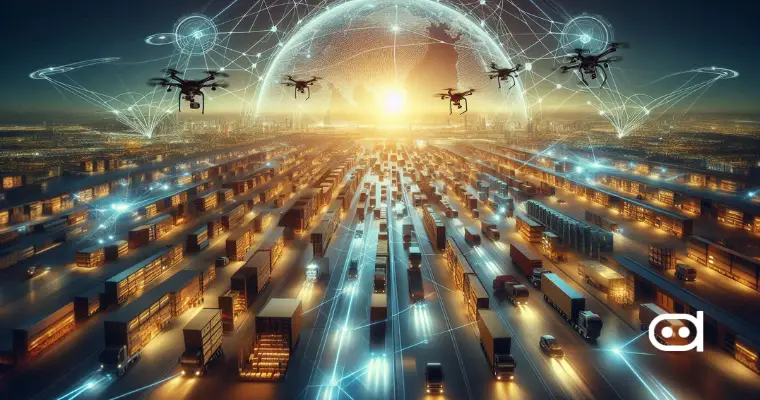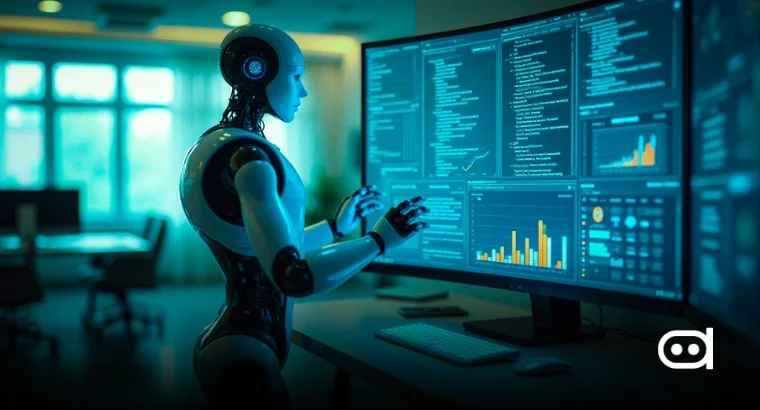
Artificial intelligence represents the industrial revolution transforming the manufacturing industry, making it more efficient and innovative. AI applications in manufacturing include deploying machine learning algorithms, computer vision, AI in industrial robotics, and data analysis to improve processes and outcomes. Smart factories and AI in predictive maintenance are becoming essential components for any manufacturer looking to increase output and operations. However, as technology advances, it has also elevated the standards for responsible and ethical applications of AI. Responsible AI deals with fairness, transparency, and accountability, making it particularly relevant to the manufacturing sector.
Impact of AI on Industrial Manufacturing
Artificial intelligence helps the industrial sector work without human errors and reduces the time taken for innovations to bear fruit. Below are some of the areas in manufacturing where AI plays a big role:
AI in Industrial Automation
AI in industrial automation is one of the most life-changing applications of artificial intelligence technology in manufacturing. AI-based intelligent systems and robots are now fully capable of performing repetitive activities accurately, relieving humans while speeding up production. Machine programs optimize the flow of work by changing activities in real-time based on sensor data. AI incorporates predictive maintenance, anticipating the need for machine servicing before breakdowns, thereby reducing downtime. All of this adds to a safer and more resource-efficient environment.
AI in Supply Chain Optimization
AI in supply chain optimization can considerably improve the visibility and decision-making processes that underpin supply chain management. Algorithms can use both historical and real-time data to improve demand forecasting and, as a result, the required inventory levels for manufacturers. Intelligent logistics systems can dynamically route deliveries and schedule shipments, effectively reducing both delays and costs. AI-enabled supplier risk management uses advanced techniques to identify weaknesses in the supply chain and prevent potential unwanted consequences before they happen. The outcome means a more resilient and adaptive supply chain ecosystem at large.
AI in Quality Control
Quality assurance is yet another area in which AI has been bringing revolutionary changes. Automated inspection uses advanced machine vision systems capable of detecting defects often not seen by human eyes. They can work continuously without getting worn out, ensuring consistent quality across all items. Defect analysis by AI in quality control will discover the fundamental causes and recommend changes to process conditions to prevent recurrence. Over time, this eliminates defects and waste from items, increasing profitability.
AI Implementation in Manufacturing
There are several important steps involved in AI Implementation in manufacturing. The collection of real-world data is possible through sensors and IoT devices, enabling real-time information capture from machines during their processes. Machine-learning models would then be developed and trained using the data to model patterns and predict outcomes. The final stage is to interface the production system models with the existing IT and OT (operational technology) infrastructure. To stay current with changing dynamics, the model must be monitored and refined on a continual basis.
Establishing Robust AI Governance Frameworks
As AI becomes a critical part of manufacturing, a governance structure has to be put in place to ensure its responsible and accountable use. Effective AI governance in manufacturing lays out the architecture crucial to managing risks and compliance while developing trust among stakeholders. It also introduces policy frameworks and mechanisms for policy oversight, and mechanisms for performance monitoring.
AI Governance Structures and Roles
Governance frameworks clearly define roles and responsibilities relating to AI systems. Responsibilities include accountability for data collected, model development, and decisions made based on model outcomes. Cross-functional Artificial Intelligence governance committees would comprise IT, operations, legal, and ethics professionals who have ultimate oversight of AI initiatives.
Data Governance and Security
Upholding high-quality data for AI lays the foundation. Data governance is setting up measures around the accuracy, consistency, and completeness of data. Data privacy and security protocols form part of the plan against sensitive data breaches or misuse. In an interconnected manufacturing environment across multiple systems or geographies, strong data governance ensures the AI models are compliant with regulations such as GDPR and CCPA.
Navigating the Ethical Landscape of AI in Manufacturing
Ethics turn into a challenge for AI in industrial manufacturing when increased dependency on artificial intelligence becomes rife. Here’s how you can navigate the ethical landscape:
AI Ethics Guidelines and Principles
Creating and abiding by the AI ethics in manufacturing guidelines becomes of paramount importance. The four pillars are transparency, fairness, accountability, and safety. Transparency is the clear and explicable process of AI decision-making, while fairness demands the elimination of bias and equitable treatment across users and scenarios. Accountability necessitates determining who is responsible for the outcome of AI applications and ensuring that they do not pose a risk to anyone working with or consuming AI-produced items.
Ensuring Human Oversight and Control
The intervention of humans is still required at the time when AI becomes more intelligent. Humans should review decisions that significantly impact safety and employment. Humans enhance trust and provide ethical judgments that machines cannot replicate. This adoption is responsible and sustainable, wherein the operators are aided by AI rather than replaced.
Practical Strategies for Responsible AI Implementation
Manufacturers will need to be very proactive about the entire AI design lifecycle, from data creation to system deployment, following AI ethics guidelines.
Developing Ethical AI Training Programs
All team members require training in the responsible use of AI, which will include everything from data ethics to AI bias, interpretability to AI governance protocols. Workshops, simulations, and even certifications can improve awareness and competence across roles.
Building Transparency and Explainability into AI Systems
Thanks to “explainable AI” or XAI technologies, stakeholders can understand how decisions are formed. Dashboards, graphs, and model documentation are available to provide users with a trail of AI reasoning. Where quality and safety are a concern, as they are in most manufacturing processes, AI decisions can be traced for accountability and quicker resolution. This will ensure regulatory compliance and further develop the relationship with stakeholders.
Future of Responsible AI in Manufacturing
The future of AI in manufacturing will be phenomenal but will also bring new ethical and governance challenges. Advanced technologies such as generative AI, digital twins, and collaborative robots promise even higher productivity and customization levels. At the same time, the development of such frameworks will require new ethical norms and constant supervision. As human intervention decreases, it becomes increasingly important to ensure that AI system operations respect societal values and standards. In the future, research into AI ethics, interdisciplinary collaboration, and adaptable governance models will be critical. The manufacturers may support long-term growth and innovation by focusing on responsible Artificial Intelligence.
Conclusion
Responsible AI in manufacturing is more of a strategic demand than a proven technical necessity. Responsible AI forms configurations that endorse accountability, fairness, and inclusiveness and thereby helps manufacturers sidestep unintended consequences and reputational risks. Future system designs will thus become even more resilient with the involvement of human supervision as long as their decision-making is transparent and based on widely held values. As AI technologies evolve, it will become increasingly important to cultivate a culture of continual learning and ethical reflection. Manufacturers who prioritize ethical AI practices in manufacturing today will gain a competitive advantage and, in the long run, will be sustainable, inclusive, and ethical. Thus, responsible AI enables the industry to integrate innovation with integrity, resulting in a more just and trustworthy tomorrow.





